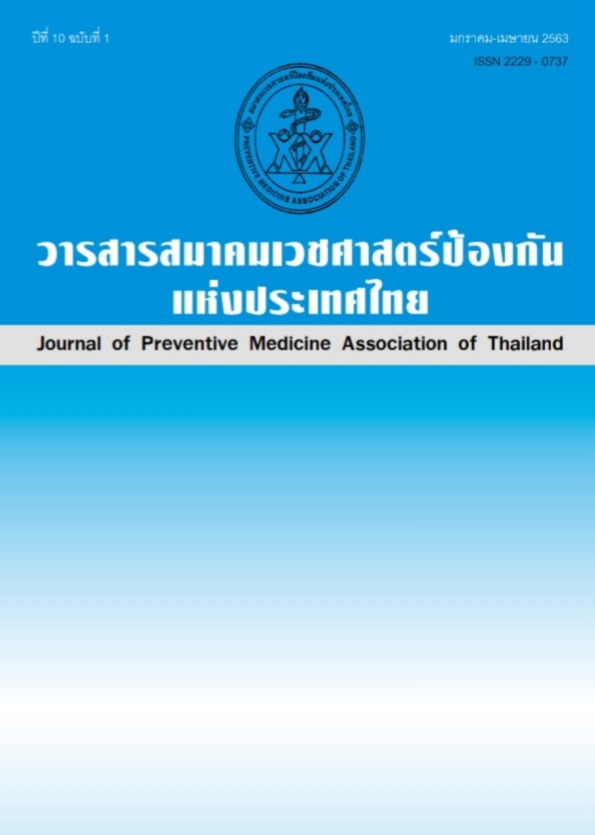Adherence and Drug Related Problems to Antiretroviral Medication among HIV/AIDS Patients in Buengkan Hospital
Keywords:
Adherence, Drug Related Problems, Adverse Drug Reaction, CD4 cellsAbstract
This study was to investigated Adherence and drug related problems to antiretroviral medication among HIV/AIDS patients in Buengkan Hospital. This study is prospective study. The data were collected during the period from February 2017 to May 2017, 200 patients with random sampling. The result of the study showed that patients who received antiretroviral treatment were female about 51.50% and male about 48.50% most were between 40-49 years and 30-39 years, 47.50% and 34.50%, respectively, have a CD4 cells<500 cell/mm3 59.00% and a Viral load=0 copy 70.50%. The sample about 67.50% had very good adherence and good adherence about 25.00%. Most of the non-adherence in drug use miss time over 30 minute (79.44%) and forgetfulness of medication lead to lack of medication, lack of medication (6.54%, 6.54%). Found drug related problems, 5.50% majority was due to the absence of medication to be treated and adverse drug reactions (2.00% and 2.00%). And found that the age group 35 years had adherence, which was higher than the age <35 years group with statistical significance (p=0.013) And found that the viral load
50 copy group had higher adherence than the viral load > 50 copy group with statistical significance (p=0.013). The conclusion, This study was used to provide a multidisciplinary team of caregivers. Providing advice will allow patients to collaborate more on medication and reduce the problem of long-term resistance. It is better.
References
2. Paterson DL, Swindells S, Mohr J, Brester M, Vergis EN, Squier C, et al. Adherence to protease inhibitor therapy and outcomes in patients with HIV infection. Ann Intern Med 2000;133:21-30.
3. เกสรวี ละม้ายสกุล. คุณภาพชีวิตในมิติสุขภาพของผู้ติดเชื้อเอชไอวีและผู้ป่วยเอดส์ที่ได้รับยาต้านไวรัสในโรงพยาบาลระดับทุติยภูมิ จังหวัดสมุทรสาคร. [วิทยานิพนธ์ปริญญาพยาบาลศาสตรมหาบัณฑิต]. นครปฐม: มหาวิทยาลัยคริสเตียน; 2555.
4. Watt MH, Maman S, Golin CE, Earp JA, Eng E, Bangdiwala SI, et al. Factors associated with self-reported adherence to antiretroviral therapy in a Tanzanian setting. AIDS Care 2010;22:381-9.
5. Mukui IN, Ng’ang’a L, Williamson J, Wamicwe JN, Vakil S, Katana A, et al. Rates and predictors of non-adherence to antiretroviral therapy among HIV-Positive individuals in Kenya: results from the Second Kenya AIDS Indicator Survey 2012. PLoS One 2016;11:e0167465. DOI:10.1371/journal.pone.0167465
6. แสงเดือน กิ่งแก้ว, วันทนา มณีศรีวงศ์กูล, พูลสุข เจนพานิชย์ วิสุทธิพันธ์. ความสัมพันธ์ระหว่างปัจจัยคัดสรร พฤติกรรมสุขภาพกับความต่อเนื่องสม่ำเสมอในการรับประทานยาต้านไวรัสของผู้ติดเชื้อเอชไอวี. วารสารพยาบาลสาธารณสุข 2558;29:1-14.
7. ณัฐาศิริ ฐานะวุฑฒ์, ศันสนีย สินารักษ์. ความร่วมมือในการใช้ยาของผู้ติดเชื้อเอชไอวีและปัจจัยที่เกี่ยวข้องในยุคของการเข้าถึงการรักษาด้วยยาต้านไวรัสเอดส์อย่างถ้วนหน้า. สงขลานครินทร์เวชสาร 2557;32:11-22.
8. Gokarn A, Narkhede MG, Pardeshi GS, Doibale MK. Adherence to antiretroviral therapy. JAPI 2012;60:16-20.
9. Wasti SP, Simkhada P, Randall J, Freeman JV, Teijlingen V. Factors influencing adherence to antiretroviral treatment in Nepal: A mixed-methods study. PLoS One 2012;7:1-11.
10. สำนักโรคเอดส์ วัณโรค และโรคติดต่อทางเพศสัมพันธ์ กรมควบคุมโรค. รายงานผลการดำเนินงานสำนักโรคเอดส์ วัณโรค และโรคติดต่อทางเพศสัมพันธ์ ปี พ.ศ. 2559. นนทบุรี: กรมควบคุมโรค; 2559.
11. ศุภาภิลัย วิโรจน์จริยากร. ผลของการให้บริการของคลินิกรับยาต่อเนื่องโดยเภสัชกรในผู้ติดเชื้อเอชไอวี ณ โรงพยาบาลร่อนพิบูลย์. [วิทยานิพนธ์ปริญญาเภสัชศาสตรมหาบัณฑิต]. สงขลา: มหาวิทยาลัยสงขลานครินทร์; 2556.
12. ธิดารัตน์ สุจิพิธธรรม, วิทยา กุลสมบูรณ์, อุษาวดี มาลีวงศ์. การวัดความร่วมมือและปัจจัยที่มีผลต่อความร่วมมือในการใช้ยาต้านไวรัสเอดส์ในผู้ป่วยที่ติดเชื้อเอชไอวีและผู้ป่วยเอดส์ ณ โรงพยาบาลตากสิน. Journal of Public Health and Development 2012;10:29-39.
13. Maneesriwongul WL, Tulathong S, Fennie KP, Williams AB. Adherence to antiretroviral medication among HIV-positive patients in Thailand. J Acquir Immune Defic Syndr 2006;43:119-22.
Downloads
Published
How to Cite
Issue
Section
License
บทความที่ลงพิมพ์ในวารสารเวชศาสตร์ป้องกันแห่งประเทศไทย ถือเป็นผลงานวิชาการ งานวิจัย วิเคราะห์ วิจารณ์ เป็นความเห็นส่วนตัวของผู้นิพนธ์ กองบรรณาธิการไม่จำเป็นต้องเห็นด้วยเสมอไปและผู้นิพนธ์จะต้องรับผิดชอบต่อบทความของตนเอง






